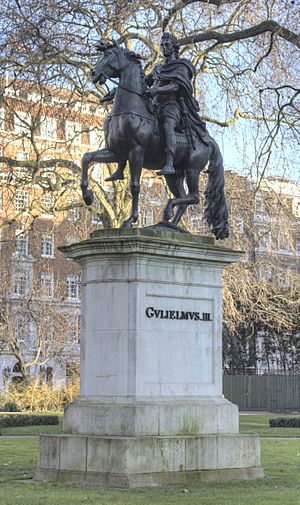Equestrian statue of William III, London facts for kids
Quick facts for kids Equestrian statue of William III |
|
|---|---|
 |
|
| Artist | John Bacon Junior |
| Completion date | 1808 |
| Type | Equestrian statue |
| Medium | Bronze |
| Subject | William III |
| Location | St James's Square London SW1 |
|
Listed Building – Grade I
|
|
| Official name | Statue of William III (in centre of square) |
| Designated | 24 February 1958 |
| Reference no. | 1235855 |
The equestrian statue of William III by John Bacon Junior stands in St James's Square in central London. It looks a lot like an older statue of the king in Bristol, made by John Michael Rysbrack. A man named Samuel Travers, who was a Member of Parliament, left money in his will in 1724 to pay for this statue. But it took 70 years for anything to happen! John Bacon Junior's father, John Bacon Senior, first drew plans for it in 1794. But he didn't get to build it. So, his son, John Bacon Junior, finished the job, and the statue was put up in 1808. The statue is a Grade I listed structure, which means it's very important.
Contents
The Story Behind the Statue
Who Was William III?
William III, also known as the Prince of Orange, became King of England in 1688. This happened after James II was removed from power in an event called the Glorious Revolution. William ruled alongside his wife, Mary, who was James's daughter, until she passed away in 1694. He then ruled alone until his own death in 1702.
Plans for a Monument
As early as 1697, people wanted to build a statue to honor King William III. They thought St James's Square would be a good spot because many of his supporters lived there. However, nothing happened. Two more attempts to start the project, in 1710 and 1721, also didn't work out.
In 1724, a government official named Samuel Travers left money in his will for the statue. He wanted it to be a "glorious memory" to his "master William the Third." Even with this money, it took another 70 years for the project to move forward!
The Bacon Family's Role
Finally, in 1794, John Bacon Senior, who was a very famous sculptor at the time, was chosen to design the statue. Sadly, he passed away before he could finish the work. So, his son, John Bacon Junior, took over. He completed the design and built the statue, which was finally put in place in 1808.
What the Statue Looks Like
A Roman General on Horseback
The statue is made of bronze and shows King William III dressed like a Roman general. It was greatly inspired by the earlier statue of William in Bristol, which was put up in 1736. The king is riding a "spirited" (lively) horse. Even though his clothes look ancient Roman, William's hair is styled like it would have been in the late 1600s.
Hidden Details and Inscriptions
Some people believe that the base of the statue includes a small detail showing a molehill. This is because King William's horse, Sorrel, stumbled over a molehill at Hampton Court Palace. This accident led to the king's death from health problems.
There are also bronze words on the sides of the statue's base. One side says GVLIELMVS III, which is Latin for William III. The other side says I. BACON, IVNR. SCVLPTR. 1807, telling us that John Bacon Junior was the sculptor and that it was made in 1807.
A Protected Landmark
In 1958, the statue was given a special status as a Grade I listed structure. This is the highest level of protection for buildings and structures in the UK, meaning it is considered to be of "exceptional interest" and very important to history.
 | Anna J. Cooper |
 | Mary McLeod Bethune |
 | Lillie Mae Bradford |

